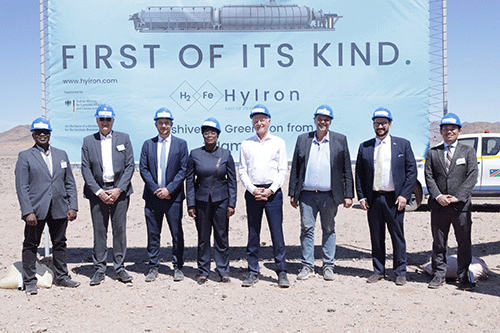ARANDIS – Namibia is set to be the first country in the world to produce iron using renewable energy.
This development is in a quest to combat the much-talked-about climate change, and to leapfrog carbon-heavy industrialisation.
On Monday, the ground-breaking ceremony took place, about 30
kilometres outside Arandis in the
Erongo region at farm Bloomfontein 109, for a N$600 million project known as HyIron Oshivela. This will be the first industrial climate-neutral iron production facility in the world.
Traditionally, iron is produced by adding coke (petroleum) from hard coal in a blast furnace. This releases a lot of carbon dioxide (CO2). Steel production is currently responsible for around one-eighth of global CO2 emissions, and therefore contributes significantly to climate change.
A direct reduction plant, on the other hand, does not require coke, and uses natural gas or hydrogen as a reducing agent. Direct reduction with green hydrogen requires a sufficiently high potential of renewable energy. This potential is available in
Namibia.
At the event, special envoy for German-Namibian energy and climate cooperation Rainer Baake said the project offers an opportunity to establish a green hydrogen economy in Namibia, and to decarbonise downstream value chains.
“For example, the sponge iron produced here can also be used as a preliminary product in steel production in Germany, e.g. to manufacture green steel to produce wind turbines or vehicles. It is particularly important in a water-scarce country like Namibia that water is recycled in this project,” he added.
With a planned commissioning in late 2024, Oshivela will be one of the biggest primary production sites of green iron worldwide.
In the first phase, the plant is expected to produce 15 000 tonnes of directly-reduced iron per year, and is set to employ 50 people.
HyIron managing director Johannes Michels noted that the global demand for iron is projected to increase rapidly from 1.9 billion tonnes per year (current) to 2.2 billion tonnes by 2030.
“The Oshivela project, with an annual production potential of 1 million tonnes iron per year, is projected to avoid 1.8 million tonnes of CO2 per year. If applied to the needed additional production capacities of 300 million tonnes until 2030, 540 million tonnes CO2 could be avoided yearly by
2030, providing an enormous contribution in the fight against climate change,” he
enthused.
The Oshivela project consortium consists of three German companies, namely CO2Grab GmbH, TS Elino GmbH and LSF GmbH & Co. KG.
Michels noted that employment opportunities are immense, as the project has a long journey within Namibia.
“We do not see us making any loss, because Namibia is the first country to produce green iron. The country is blessed with iron deposits. Even the Kunene region has iron, while its struggling with socio-economic well-being,” the MD added.
At the same occasion, Minister in the Presidency Christine //Hoebes said the world is facing severe pressures because of
climate change, putting millions of lives at risk.
“The HyIron Oshivela project has the potential to contribute towards the decarbonisation of the planet, while positioning Namibia at the forefront of the green industrial transition. Because of this project, Namibia will become the first country in the world to produce green iron, which is iron produced at zero emissions,” she observed.
The minister added that the goal is realised using Namibian green hydrogen to add further value to iron ore, and ultimately manufacturing direct reduced iron (DRI) right here in the country. Local value-addition, she said, leads to the creation of jobs in the value chain, and throughout the wider economy. By enhancing products through local processing, Namibia can thus
command higher market prices, increasing the economic benefits for the country.
“By choosing to do business in Namibia, you are assured of a strong legal system and independent Judiciary that protects the rights of investors, and that allows disputes, if they arise, to be settled through the courts or international arbitration. Additionally, Namibia is a safe country with political stability,” the minister said assuredly.
– mndjavera@nepc.com.na


